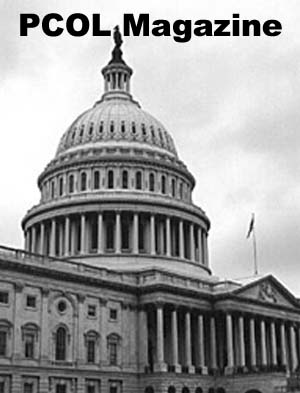January 22, 2004 - US Senate: Senate finally passes HR 2673 on January 22 with $325M for Peace Corps
Peace Corps Online:
Peace Corps News:
Special Reports:
August 10, 2004 - PC changes "cash in lieu" travel policy:
January 22, 2004 - US Senate: Senate finally passes HR 2673 on January 22 with $325M for Peace Corps
 | PC changes "cash in lieu" travel policy
Read and comment on this memo from Peace Corps' General Counsel that explains the new policy for paying "cash in lieu" to Volunteers at their Completion of Service (COS). New RPCVs can still take the long way home, though they will likely have less money in their pockets because of the new policy. Peace Corps received $30 million more this year than in FY03 but is there a budget crunch now at Peace Corps? What do you think of the new policy? |
Senate finally passes HR 2673 on January 22 with $325M for Peace Corps

Over three months after the start of the FY2004 fiscal year, the Senate finally passed Consolidated Appropriations Bill HR2673 on January 22 that included funding for the Peace Corps at $325 million, $30 million above FY03 but $30 million below the President's request. The Bill includes a direct appropriation of $310M for the Peace Corps plus another $15M under the Global HIV/AIDS Initiative to carry out activities to combat HIV/AIDS, tuberculosis and malaria.
On November 19, PCOL reported that the Foreign Operations Appropriations Bill had gone to conference and that the joint Senate-House Conference Committee had agreed to fund Peace Corps at the higher level. The original House version of the bill had included an appropriation $314 million for the Peace Corps, $45 million below President Bush's request of $359 million for FY 2004.
Instead of voting on each appropriations bill separately, the Republican leadership in Congress decided to consolidate seven separate appropriations bills in an Omnibus package that includes the Foreign Operations Appropriations Bill that contains the Peace Corps appropriation. The Foreign Operations Appropriations Bill was one of only two of the seven bills that had been previously approved in conference.
The prediction that PCOL made in our December 7 story before Congress went into recess that the Peace Corps would be funded at $325M for FY2004 was correct. The Senate should be ashamed of itself for delaying the appropriations bill for over three months into the fiscal year. Since the Peace Corps cannot allocate funds with the full confidence that the funds will be appropriated until the bill is passed, the delay is disruptive to the Peace Corps' expansion plans.
Congratulations again to the Peace Corps for their increased funding which lets them move forward with their expansion plans albeit at a slower pace than the President requested when he called for a 15% increase in Peace Corps funding every year until 2007 to meet the goal he enunciated in his 2002 State of the Union address of doubling the number of Peace Corps Volunteers in the field to 14,000 over the next 5 years.
Congratulations and thanks are also in order for every RPCV and Friend of the Peace Corps who wrote or called your Senators and Representatives to ask them to increase funding to the Peace Corps. Read excerpts from the bill pertaining to the Peace Corps at:
U.S. Senate Roll Call Votes 108th Congress - 2nd Session*
* This link was active on the date it was posted. PCOL is not responsible for broken links which may have changed.
U.S. Senate Roll Call Votes 108th Congress - 2nd Session
as compiled through Senate LIS by the Senate Bill Clerk under the direction of the Secretary of the Senate
Vote Summary
Question: On the Conference Report (H. R. 2673 Conference Report )
Vote Number: 3 Vote Date: January 22, 2004, 12:30 PM
Required For Majority: 1/2 Vote Result: Conference Report Agreed to
Measure Number: H.R. 2673 (Agriculture, Rural Development, Food and Drug Administration, and Related Agencies Appropriations Act, 2004 )
Measure Title: A bill making appropriations for Agriculture, Rural Development, Food and Drug Administration, and Related Agencies for the fiscal year ending September 30, 2004, and for other purposes.
PEACE CORPS
For necessary expenses to carry out the provisions of the Peace Corps Act (75 Stat. 612), $310,000,000 including the purchase of not to exceed five passenger motor vehicles for administrative purposes for use outside of the United States: Provided, That none of the funds appropriated under this heading shall be used to pay for abortions: Provided further, That funds appropriated under this heading shall remain available until September 30, 2005: Provided further, That during fiscal year 2004 and any subsequent fiscal year, the Director of the Peace Corps may make appointments or assignments, or extend current appointments or assignments, to permit United States citizens to serve for periods in excess of 5 years in the case of individuals whose appointment or assignment, such as regional safety security officers and employees within the Office of the Inspector General, involves the safety of Peace Corps volunteers: Provided further, That the Director of the Peace Corps may make such appointments or assignments notwithstanding the provisions of section 7 of the Peace Corps Act limiting the length of an appointment or assignment, the circumstances under which such an appointment or assignment may exceed 5 years, and the percentage of appointments or assignments that can be made in excess of 5 years.
GLOBAL HIV/AIDS INITIATIVE
For necessary expenses to carry out the provisions of the Foreign Assistance Act of 1961 for the prevention, treatment, and control of, and research on, HIV/AIDS, $491,000,000, to remain available until expended: Provided, That of the funds appropriated under this heading, $15,000,000 may be apportioned directly to the Peace Corps to remain available until expended for necessary expenses to carry out activities to combat HIV/AIDS, tuberculosis and malaria: Provided further, That of the funds appropriated under this heading, not more than $8,000,000 may be made available for administrative expenses of the office of the `Coordinator of United States Government Activities to Combat HIV/AIDS Globally' of the Department of State: Provided further, That in carrying out the duties specified in section 1(f)(2)(B)(ii)(VII) of the State Department Basic Authorities Act of 1956, the Coordinator shall ensure that assistance is provided for activities in not fewer than 15 countries, at least one of which shall not be in Africa or the Caribbean region: Provided further, That of the funds appropriated under this heading, up to $75,000,000 should be made available for the safe and appropriate use of injections and other forms of infection control and prevention, and for blood safety programs.
Click on a link below for more stories on PCOL
Read the series on Safety and Security here

Leave your comments on the series below.
Read comments by RPCVs here, here and here.

Some postings on Peace Corps Online are provided to the individual members of this group without permission of the copyright owner for the non-profit purposes of criticism, comment, education, scholarship, and research under the "Fair Use" provisions of U.S. Government copyright laws and they may not be distributed further without permission of the copyright owner. Peace Corps Online does not vouch for the accuracy of the content of the postings, which is the sole responsibility of the copyright holder.
This story has been posted in the following forums: : Headlines; Congress; Legislation; Appropriations
PCOL9862
07
.
|
By daniel (0-1pool136-4.nas12.somerville1.ma.us.da.qwest.net - 63.159.136.4) on Thursday, January 29, 2004 - 6:29 am: Edit Post |
There was no check and balance from legislators on the quality of the program. The increase money is for expansion of Peace Corps. Doubling the numbers and increasing the numbers going to muslim countries without prevention for safety of volunteers is reckless and shortsighted on behalf of Congress and Peace Corps.
What is not mentioned is that 31 Peace Corps volunteers have been killed, died or are considered missing. There are 2,260 plus victims of violence since 1996. What has Peace Corps done to improve safety in this budget, not much in terms of prevention on the ground. They have created layers of bureaucratic macro safety policy and still left the "volunteer high and dry in terms of overall safety".
Volunteers are not always coupled together. Approximately, 25% of volunteers serve alone. 86% percent of victims of violence in service were alone at the time of their attack.
There are hearings coming in the House International Relations committee and the Senate in the Spring. Perhaps, finally Peace Corps will have to ansewer for their reckless policy. Senate Dewine and Voinivich have called for hearings.
Of these 2000 plus volunteers who are victims of violence in service, many are without health insurance due to service related injuries because FECA is an arcane system, are discriminated from service again, separated wrongfully and diminish their Peace Corps experience, not provided job development after service and are actually put down by other volunteers who may have served in looking for development jobs or even jobs with USAID or Peace Corps themselves.
These Volunteers are discounted without due process of the American law system because most can't afford an attorney to fight their service record on equal footing with Peace Corps.
Over forty percent of volunteers leave service early. Many are not serving the third goal.
Before expanding hap hazardly remember the volunteers who are serving.
Lastly, there are no memorial plaques of memorials for the Peace Corps volunteers who have fallen during service. The Peace Corps, the Congress and the American people owe these folks that honor both at Peace Corps and at home in their given home towns.
After years of struggle we may be working toward a safer and more quality program in the spring.
|
By Anonymous (106.45.171.66.subscriber.vzavenue.net - 66.171.45.106) on Monday, February 02, 2004 - 12:45 pm: Edit Post |
Every year continuing resolutions are a disruption to PC operations, whether those operations are planned for previous levels or for expansion. We need a better process. As one who has served both as a PCV and as a CD, I know the frustration of putting a hold on plans for strenthening a program at the post level while congress dithers over pork ... The uncertainty caused by months of delay in approving appropriations creates significant problems for the entire fiscal year as staff at every level are forced to change plans, alter dates, squeeze programs into tight,delayed time frames, etc. througout the year -- while trying to explain to PCVs that "we're still waiting...".
In addition, the presidential transition and subsequent, inexcusable delay in appointing a PC director had an adverse impact at post level as well as on staff/PCV morale and direction of the agency in general. For example, even low level, local-hire administrative and support positions were placed on hold during this process, even for replacements! It can be very frustrating for post to operate shorthanded in its daily operations due to dithering at the national and most senior levels in DC. Former director Mark Gearan has recommended some very solid solutions to this problem, although no progress of note has been made.
I'm sure the PC example is merely a drop in the bucket of the inefficiency caused by political processes that could be vastly improved with some will on the part of the administration and congress. Whatever happened to "reinventing government"?



